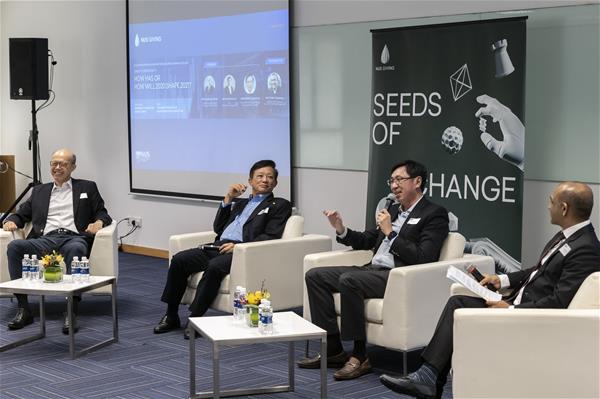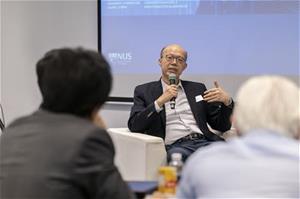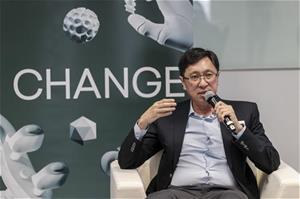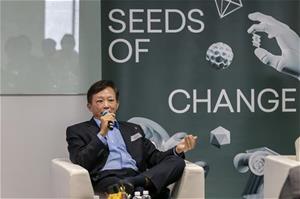Thought leaders and industry captains gathered to share insights on the global economy in the new normal.

Following an unparalleled 12 months, we enter 2021 with some light at the end of the tunnel. The arrival of vaccines will hopefully mean a swift reopening of economies. Individuals, businesses, and communities can start looking forward to shape their futures rather than just grinding through the present.
During the National University of Singapore (NUS) Giving Experience Leadership Series titled, Crisis to Opportunity: How has or how will 2020 shape 2021, NUS thought leaders and industry captains gathered to share their insights on the direction of the global economy and how businesses and communities change and adjust to the new normal.
Moderated by Professor Sumit Agarwal, Professor of Finance in Economics and Real Estate, NUS, the speakers were invited to share their lessons learned in the past year amid the pandemic to kick-off the dialogue.
 "The COVID-19 pandemic has exposed existing structural weaknesses in businesses and communities – and that is a good thing. People were able to identify the weaknesses exacerbated by the pandemic, which would have been masked in the absence of the pandemic. Change would not have taken place until many years later,” said Professor Duan Jin Chuan, Jardine Cycle & Carriage Professor of Finance, NUS.
"The COVID-19 pandemic has exposed existing structural weaknesses in businesses and communities – and that is a good thing. People were able to identify the weaknesses exacerbated by the pandemic, which would have been masked in the absence of the pandemic. Change would not have taken place until many years later,” said Professor Duan Jin Chuan, Jardine Cycle & Carriage Professor of Finance, NUS.“Pre-pandemic, my colleagues and I were reluctant to move into online teaching. We used to find all kinds of excuses to delay it. Post-pandemic though, we will be going on a hybrid mode which enables us to reach out to people all over the world,” elaborated Prof Duan.

“Change will be the new normal. Mindsets will have to change, skillsets will have to change and even business models will have to change. The pandemic has taught us that digital is here to stay. While companies embark on their digital transformation journey, both the workplace and the workforce will need to evolve to stay relevant,” highlighted Mr Thio Boon Kiat, CEO, UOB Assets Management.
Governments across the world have also stepped up on their support for individuals and businesses in the face of the global pandemic. While there are variations on how different countries are dealing with the crisis, the Singapore government has rolled out a series of monetary and fiscal measures to preserve jobs and support enterprises and households.

“Before the arrival of the pandemic, most governments are uncomfortable with giving out welfare freely. Welfare was thought to encourage over-dependency and breed laziness. Now, it is the complete opposite. Governments have become significantly more generous than before,” remarked Mr George Lee Lap Wah, former EVP and Head of Global Corporate Banking, Oversea-Chinese Banking Corporation.
“The pandemic has also significantly widened the rich-poor divide. So where do we draw the line? Can society still go on and say every man for himself?” Mr Lee added.
All three speakers agreed that opportunities will still be abundant, but Singaporeans will need to have resilience and drive as they prepare themselves for the future. The twin pillars of digitalisation and sustainability will be the keys to shaping the future.
For further information on the NUS Giving Experience Leadership Series, contact the Events team at dvoevents@nus.edu.sg.






